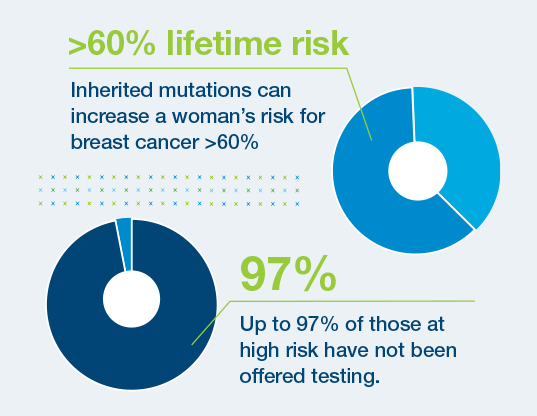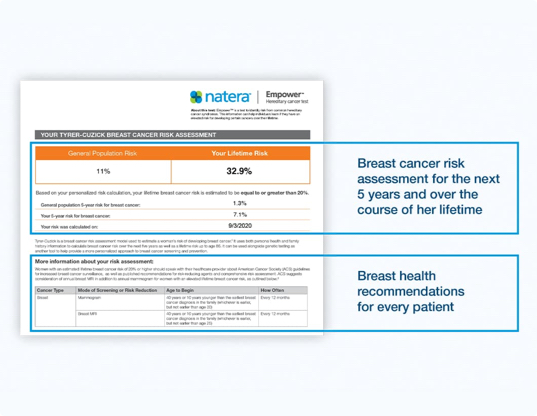Get Ahead of Cancer: Create Previvors – Breast Cancer Awareness
View our resources, including a conversation about how to improve care for high-risk women, online and in-person support tools for hereditary cancer risk assessment and testing, plus fertility preservation options. Listen to our webinar, “More Informed Treatment with Hereditary Cancer Testing: A Panel Discussion,” to hear from Women’s Health clinicians and their patients.

Genetic insights for breast care
- Breast cancer is the most common cancer in the US, 30% of all cancers in women and >20% of all cancers combined.
- Inherited mutations can increase a woman’s risk for breast cancer up to 87%1, up to 97%2 of women who carry that risk don’t know it.
- Patients who know their hereditary or familial cancer risk have better outcomes than those who don’t.
- Empower can help to inform families about their risk for breast cancer, and what prevention screening or treatment strategies may be recommended based on
their risk profile.
Start with a few simple questions
When to consider hereditary cancer testing
- Personal or family history of breast cancer at age 50 or younger
- Personal or family history of ovarian, uterine/endometrial, male breast or pancreatic cancer
- Multiple cancers or tumors on the same side of the family
- Ashkenazi ancestry

Education for Clinicians
Education for Patients
Tyrer-Cuzick for Precise Breast Cancer Risk Information on Reports
Empower includes Tyrer-Cuzick results on reports for a more comprehensive breast cancer risk assessment. Tyrer-Cuzick is a breast cancer risk model for patients with a negative result on the Empower Hereditary Cancer Test. Medical guidelines support its use to calculate a woman’s breast cancer risk both in the next 5 years and over the course of her lifetime. Tyrer-Cuzick results can help you to provide a tailored medical management plan for women of all ethnicities who are under the age of 85, have not had breast cancer, and do not carry a mutation in a breast cancer gene.


Broaden access to genetic information in your community with Empower
- Tyrer-Cuzick breast cancer risk assessments for patients of all ethnicities
- Patient education materials and videos in multiple languages
- Genetic information sessions for patients in their preferred language
Vital Testing Made Affordable
Natera is committed to ensuring patient access to testing for all who can benefit.

In Network Provider
Natera is proud to be an in-network provider with most health plans, including Anthem, Cigna, and UnitedHealthcare.

Compassionate Care Program
Patients who qualify for our compassionate care program will pay no more than $149 per test and may owe nothing, depending on their financial situation.
Natera also offers self-pay cash options and interest-free payment plans.

Family Testing Program
Testing for all blood relatives of patients with a positive result is available at no additional charge*. The test can be ordered by the provider with a copy of the patient’s test result.
*Order must be received within 90 days of original report date. Panel must be the same size or smaller compared to previous relative’s test order. Not available to family members covered by government insurance plans.
Learn how to offer Empower at your practice.
Contact your Natera representative or fill out the form below to have a rep contact you.
We’re here to help. Contact Natera Customer Care at 844.778.4700 or support@natera.com
References
1 NCCN Clinical Practice Guidelines in Oncology Genetic/Familial High Risk Assessment: Breast, Ovarian and Pancreatic v1.2020.
2 Knerr S, Bowles EJA, Leppig KA, Buist DSM, Gao H, Wernli KJ. Trends in BRCA Test Utilization in an Integrated Health System, 2005-2015. J Natl Cancer Inst. 2019 Aug 1;111(8):795-802. doi: 10.1093/jnci/djz008. PMID: 30753636; PMCID: PMC6695306.
https://www.nccn.org/professionals/physician_gls/pdf/genetics_bop.pdf